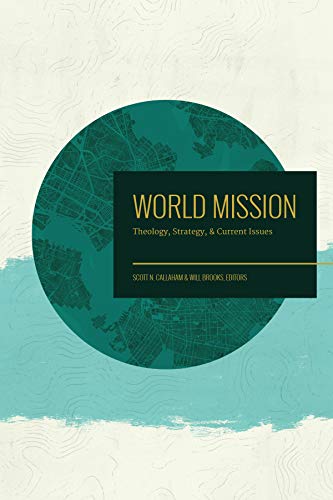
Today’s post is the first part of my interview with Scott Callaham, Lecturer of Hebrew and Old Testament at Baptist Theological Seminary in Singapore. I have spotlighted his work previously, most recently about writing worship songs in Chinese. A few years ago, I also highlighted his article about teaching Hebrew in Chinese.
In the interview, I ask Scott about a book he co-edited (along with Will Brooks) titled World Mission: Theology, Strategy, and Current Issues (Lexham, 2019). I briefly introduced it in a previous post.
This is what emerges when a Hebrew grammarian partners with a missiologist. Together, they put together a truly diverse group of theologically-minded practitioners, whose expertise span the globe and the academy. The integrated nature of World Mission makes a unique contribution to missions literature. Enjoy the interview!
JW: Most missions textbooks have chapters on “New Testament foundations,” perhaps even “Old Testament foundations.” How then is World Mission different?
SC: World Mission presents a completely different perspective than the majority of missiology books, in that our contributors share a thoroughgoing commitment to the full authority and sufficiency of all of Scripture. From the first page onward, the reader can discern the difference that our approach entails. And, by the way, we do not use the metaphor of biblical “foundations” at all.
We think the “foundations” metaphor is flawed. It’s possible to construct a theological “building” that rests upon the Bible as a “foundation” but then simply forget the Bible like one forgets the foundation under their house. Instead, missions thinking and practice should grow organically from Scripture as a stout redwood grows upward from its roots.
This kind of biblical “foundation” all too often serves missiologists as a biblical “pretext.” That is to say, we know what we want the Bible to say. So, we reverse engineer an approach to the Bible that justifies a certain desired outcome. This kind of biblical “pretexting” directly challenges Scripture’s authority and sufficiency.
JW: Can you give an example?
 SC: Sure. Let me illustrate what I mean from the first chapter, “Old Testament Theology and World Mission.” It does not force the Old Testament to conform to a predetermined script in order to reach foregone conclusions. Instead, our biblical theology-centered approach lets the Old Testament speak for itself regarding the fate of the nations in the hand of God.
SC: Sure. Let me illustrate what I mean from the first chapter, “Old Testament Theology and World Mission.” It does not force the Old Testament to conform to a predetermined script in order to reach foregone conclusions. Instead, our biblical theology-centered approach lets the Old Testament speak for itself regarding the fate of the nations in the hand of God.
The uniqueness and value of our approach comes fully into view. When one takes the Old Testament seriously as the majority of the canon of Scripture, it recovers its own voice in the church’s theology. Apprehending the beauty of the Old Testament’s graceful song is a necessary precondition for hearing the harmonic line that the New Testament adds to the chorus of biblical theology.
The Old Testament theology chapter concludes with specific assertions about how the contemporary practice of world mission must change to conform with biblical teaching in the Old Testament.
JW: Ok, what about the New Testament?
SC: The second chapter addresses the New Testament as a collection of missional documents written for a church carrying out Jesus’s mission. New Testament theology issues a call to the church to join in Jesus’s mission in union with him. Our theology section closes with a biblical theology chapter: a move that may surprise some readers. After all, after fresh and extensive treatments of Old and New Testament theology with regard to mission, what’s left to discuss in the realm of biblical theology?
Actually, the biblical theology chapter is no mere rehearsal of what comes before. It’s a look at how God unfolds his purposes for all peoples through the covenants, culminating in the new covenant announced in the prophetic books and actualized in the New Testament.
JW: The book isn’t only for theologians. So, what are implications for mission strategy?
SC: Treatments of mission strategy typically lean heavily on organizational, sociological, and anthropological studies and theory. Insights from these fields of knowledge certainly hold value. But today’s challenges rapidly pass away as new ones arise.
So, there’s a tendency to chase conditions on the field that rapidly change rather than focus upon biblical guidance on strategy, which does not change. Therefore, our strategy section walks through the elements of the Great Commission in sequence. Our Lord’s command is to make disciples.
This observation seems obvious. Mentioning it would be unnecessary but for the mass of contemporary “missions” literature that evidences little or no disciple-making intention. Sadly, entire books on mission strategy exist that do not mention discipleship at all! Applying what Jesus means by making disciples should form the bedrock of mission strategy.
JW: The chapter by Jarvis Williams, I think, is provocative yet constructive. Tell us about that chapter.
SC: That chapter considers who should become Jesus’s disciples: all nations (meaning people groups defined demographically) or all nations (everyone, everywhere). Some may suggest that we set up a false dichotomy here, but we argue that this dichotomy already exists.
Prominent voices in missiology reason that if every people group in the world becomes “reached” to some arbitrary standard, then the church will have obeyed the Great Commission and Jesus will return. Rather than rely on a host of mutually interdependent and arguably theoretical assumptions, we ask, “What does the Bible itself mean by the phrase ‘all nations’?”
JW: The book talks about baptism too. Why? Few if any missions books highlight the topic.
SC: Baptism is a non-negotiable, integral component of world mission strategy. Simply put, where there is no baptism or plan for baptism to take place, there is no Great Commission obedience. Systematic theologies, church traditions, and Western missiological theories that obfuscate or contradict the meaning of baptism in Scripture contribute to the erosion of world missions. They resist carrying out Christ’s command to make disciples.
JW: I’m glad to see the book looks at theological education. Explain what you mean. Should we catalyze “seminary planting movements”?
SC: Not exactly, though I’d love to see more healthy seminaries pop up around the world!
That chapter promotes theological education at all levels. Both informal and traditional formal models are critical elements of world mission strategy. The goal of theological education is to teach obedience to all of Jesus’s commands.
Anything less than full support of theological education efforts runs the familiar risk of paternalism in mission. We risk setting missionaries as presumptuous, self-appointed filters of what people need to know to be Jesus’s disciple and to grow in faith.












